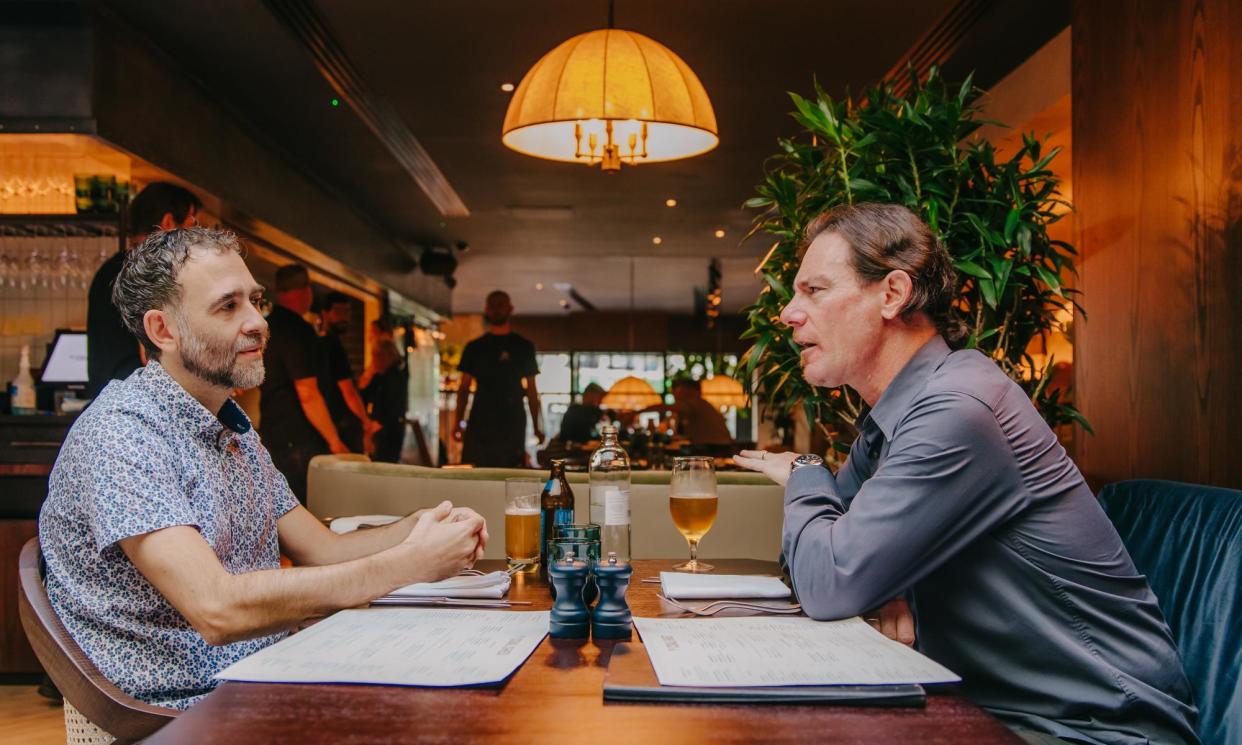Dining across the divide: ‘I’m not 100% sure I would be against corporal punishment in schools’

Joe, 46, Brighton
Occupation Director at a children’s charity
Voting record Not tribal; leans towards the most progressive local candidate
Amuse bouche Used to be a bingo caller in mega-halls – 3,000 people, all taking it very seriously
Gabriel, late 40s, East Sussex
Occupation Teacher
Voting record Labour
Amuse bouche He was escorted out of Washington DC at gunpoint by officers and plain-clothed secret agents. He had been cleaning his teeth in a public fountain close to Capitol Hill
For starters
Gabriel I thought he looked like a Silicon Valley casual/north London mature boho. About my age.
Joe Really warm and friendly – we fell into easy conversation straight away. I was struck by his accent: he’s been away from Australia for 25 years, but it’s still quite strong.
Gabriel I had firecracker cauliflower, espelette fries, which is a posh way of saying spicy cheesy chips. And roast squash. The place was fantastic.
Joe I had bread, anchovies and chicken.
The big beef
Gabriel The big topic was punishment – I work in schools, he works with a young people’s charity. He thinks punishment doesn’t fix the issue, so therefore it’s of limited value. I said: “I’m on the frontline, I’m dealing with kids all the time – there is a behaviour crisis in schools.” Teachers are leaving. We had 15 who left at the end of the last school year, some with 20 or more years of teaching, without another job in front of them. That’s how desperate they were. I was trying to explain that our hands are tied. There are no exclusions any more. The deterrent needs to exist, there have to be consequences.
Related: Dining across the divide: ‘The UK rioters are career thugs, but I do feel some sympathy’
Joe I felt very strongly that that’s just dealing with the symptom, rather than the problem. If we want a better society, it’s really important to think about why people are behaving in this way. If we over-focus on bad behaviour and punishment, it becomes about compliance, rather than people taking account of their own behaviour and wanting to change it.
Gabriel We touched on corporal punishment, and he said, aghast: “You wouldn’t be for that?” And I said: “I’m not 100% sure I wouldn’t be. If there was something there as a symbol, basically unused, I’m open to the idea.”
Joe There are lifelong consequences to beating children, and it’s not encouraging children to learn about positive behaviour. It’s just saying: “Don’t get caught.”
Sharing plate
Gabriel I said: “It’s basically that the country’s broke, and the normalisation of bad behaviour is chronic.”
Joe We both felt that things were worse in the UK than comparable nations, and we nailed that down to inequality – what’s changed in the last few years? How do we differ from other countries?
Gabriel I still think a lot of things are used as an excuse for bad behaviour, but we did agree that there are genuine economic drivers. We’ve got 40% special educational needs in our school. I’ve no doubt that poverty has got something to do with it.
Joe Many systems in the UK are broken, whether that’s justice, education, care. In every area, we need greater focus on early intervention and prevention rather than reacting to crisis.
For afters
Gabriel I’m a historian; economically and culturally, I think we’ve peaked, we’re going backwards now. We were talking about AI, and he quoted somebody saying it was 50:50 whether it would be good or bad for humanity, and I said: “I know human nature – history points to us probably not taking the right road, just because we’re so myopic and short-term.”
Joe Gabriel was very worried about technology, social media, the internet, mobile phones, AI – he saw them all as largely a force for bad. I was more ambivalent, in that they represent risks for us but also possibilities. Yes there are threats – AI intentionally trying to destroy the human race, or bad actors, or the “paperclip theory” of unintended consequences from runaway AI. But the consequences could easily be good: it’s about political will.
Takeaways
Gabriel We were there for four hours, and we parted saying: “We haven’t finished this conversation.” We left it on very good terms.
Joe Time went really quickly. We swapped numbers, it would be great to keep in touch.
Additional reporting: Kitty Drake
• Gabriel and Joe ate at The Coal Shed in Brighton
Want to meet someone from across the divide? Find out how to take part


